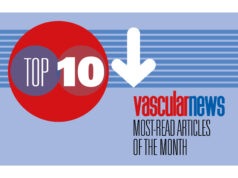With more than 100 patients enrolled,Cook Medical announced on 5 February 2013 it has exceeded 50% enrolment in the Tibiopedal Access for Crossing of Infrainguinal Artery Occlusions trial. The first-of-its-kind, prospective, multicentre study is evaluating the retrograde tibiopedal vascular access technique for treating critical limb ischaemia.
According to the trial’s global principal investigator, Craig Walker, founder, president and medical director of the Cardiovascular Institute of the South in Louisiana, up to 200 patients with totally occluded lower limb arteries will be enrolled in the study. Physicians will assess the technical success rates of the new procedure both for gaining vascular access via the foot and for crossing the lesion. Patient follow-up will consist of a telephone interview approximately 30 days after the procedure.
Using the below-the-knee, retrograde tibiopedal approach, a physician gains vascular access below the knee and advances wire guides and catheters up the leg to reach and cross arterial blockages so that the blockages may be opened. Individuals and single centres have reported initial success with the technique, which is often tried after a traditional antegrade vascular approach from above the knee fails.
The trial is open at seven trial sites across the United States: Terrebonne Medical Center in Houma, First Coast Cardiovascular Institute in Jacksonville, Metro Heart and Vascular in Wyoming, and Rex Hospital, in Raleigh, Washington Hospital Center, DC, West Virginia University, and Mount Sinai Medical Center, Miami. Patients also are being enrolled at several sites in the European Union.













